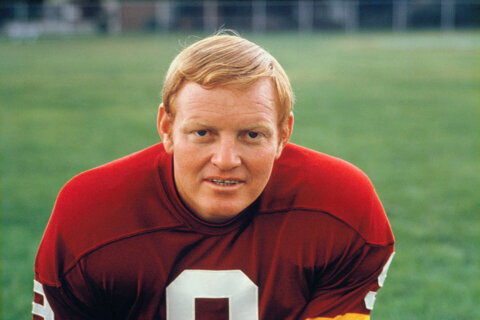WASHINGTON — The Rio Olympics have been a smashing success so far for the Americans, by nearly any standard. A dominant week in the pool set the tone for triumphs in women’s gymnastics, where the U.S. was as strong as it has ever been.
With such dominance, eyeing the Team USA medal count has become a constant habit, affirming that — as has been the case every day during Rio — the Americans are leading the way in both gold and overall medals. It’s a feature that NBC shows daily, sponsored by McDonald’s no less, perhaps the most American of all commercial symbols known around the world. There are even promos touting “what gold feels like” (sponsored by another American commercial behemoth, Coca-Cola), featuring past gold medalists dancing on the beach.
But when gold is the standard, the expectation, what is lost from the other triumphs or personal bests that don’t yield that color medal, or even a medal at all?
Monday was the first day in 29 days of Summer Olympics competition, dating back to Beijing in 2008, that the U.S. failed to win a gold medal. That’s a stunning statistic, especially when one considers the haphazard way that events in different sports are distributed around the Olympic window. And yet, there was every expectation that would continue, up until the minute that it didn’t.
Allyson Felix was already a decorated Olympian before she ever took the track for the 400-meter final Monday night. But she was also the favorite in that race, expected to add a fifth gold medal to her tally, and a second individual gold, complementing her 2012 gold in the 200 meters in London. When sprinter Shaunae Miller of The Bahamas dove for the finish line and nipped Felix by a mere seven hundredths of a second, questions of how legitimate her win was dominated the conversation, despite the fact that there was nothing illegal (or even tactically advantageous) about it. And it was despite the fact that Felix had just become the most decorated female American runner in history by winning her seventh medal, with silver.
The fact that it wasn’t her fifth gold, something no woman has achieved in track and field, rendered it a letdown.
When Simone Biles wobbled on the balance beam and had to grab on to ensure she didn’t fall earlier Monday afternoon, she cost herself enough of a deduction to lead to a third-place finish, taking home the bronze medal. Instead of celebrating another medal, the headlines read “Biles’ run at Olympic history ends.” Her win on the floor exercise Tuesday night gave her five medals, four of them gold, an unfathomable tally for nearly any athlete on the planet.
It’s insane that winning four gold medals and a bronze in five events could be, to anyone, less than spectacular, but that’s what astronomical expectations can do to us.
But some of the best moments have been the non-golden ones, from the athletes who have been so thrilled just to find their way onto the podium.
In the pool, it was easy to get lost in the nationalistic drama playing out between cheeky American Lilly King and made-for-TV villain Yulia Efimova, one of the Russian swimmers allowed to compete in spite of the discovery of her country’s state-sponsored doping program. King called out Efimova and the Russians, saying they shouldn’t be allowed to compete, then beat her Russian rival in the pool to win gold in one of the more dramatic events of the games.
Behind those two was an open field, just as it had been behind King at the U.S. trials. That’s where Katie Meili, a 25-year-old Texan, stepped up to snag the second qualifying spot. And in Rio, she did it again, coming on strong in the final 100 to finish in 1:05.69, just five hundredths off her personal best and nearly four tenths better than her Olympic Trials time of 1:06.07. While King was triumphant, slashing the water in celebration, you might have thought by Meili’s smile that she had taken the gold.
Don’t tell Jenny Simpson, who missed the 1,500 meter final as the reigning world champion in 2012, only to come roaring back for bronze Tuesday night that it was a minor feat.
Don’t tell Emma Coburn, the first American woman ever to medal in steeplechase, that bronze doesn’t count. The Coloradan improved upon her ninth-place finish from London four years ago to break through the field late and find her way onto the podium.
Don’t tell Monica Aksamit, Ibtihaj Muhammad, Dagmara Wozniak and Mariel Zagunis that their fencing bronze in team sabre wasn’t good enough. It was, perhaps, the most American of medals won at this year’s games so far. Much like the women’s gymnastics squad, the women’s sabre team represented the melting pot of racial, ethnic and religious backgrounds that make up our country. But they did not come in with the same soaring expectations of gold.
And finally, don’t dismiss Abbey D’Agostino, who picked up New Zealand’s Nikki Hamblin after each tripped and fell, ensuring they finished their heat of the 5,000 meters.
After colliding, @abbey_dags (#USA) & @NikkiHamblin (#NZL) showed true #Olympic spirit. https://t.co/LJf9pw7jAv https://t.co/HTfixzPeks
— #TokyoOlympics (@NBCOlympics) August 17, 2016
D’Agostino injured her knee in the incident, but both runners advanced to the final Friday after successful protests of their results. We won’t know if D’Agostino will be physically able to run yet (Update: she suffered a torn ACL and meniscus as well as a strained MCL, on which she ran the final 2,000 meters or so, but is out for the final), but that she is allowed to is only fitting after reminding us that while every Olympic athlete dreams of what gold feels like, this is what it really means to compete and partake on the largest stage for sports in the world.







